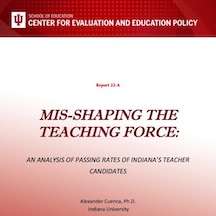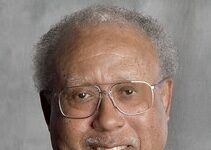 A new study by Alexander Cuenca, an associate professor in the School of Education at Indiana University, shows how the state’s teacher’s licensing examination contributes to the shortage of teachers in the state, especially for teachers of color.
A new study by Alexander Cuenca, an associate professor in the School of Education at Indiana University, shows how the state’s teacher’s licensing examination contributes to the shortage of teachers in the state, especially for teachers of color.
The study found that Black and Hispanic prospective teachers scored up to 52 percentage points lower than their White peers on portions of the state licensing examination, known as Praxis. This has the effect of shrinking the pool of nonwhite educators that enter the profession even as the K-12 student population grows more diverse.
The traditional road to becoming a teacher has long-held stumbling blocks for candidates of color. But recent staffing shortages have made it critical to recruit more candidates into the teacher pipeline. As a result, some states and schools are dropping requirements like a license or degree in order to fill open positions.
The solution isn’t necessarily to get rid of Praxis and other tests like it, said Dr. Cuenca, but to diversify the expert panels that determine passing scores for prospective educators, as well as offer more support for would-be test-takers. Tests are scored on a scale, with each state setting its passing score. To determine those scores, the state and the testing company assemble panels of subject matter experts from schools and universities to determine which questions a new “just qualified” teacher should answer correctly. When Indiana undertook this process in 2020, 92 percent of the certified educators that participated in the panels identified as White, compared to 2 percent who identified as Black. About 92 percent of Indiana’s 79,000 teachers are White, according to the Indiana Department of Education, compared to just 66 percent of the state’s 1.1 million students.
“We know that more teachers of color in the classroom will improve outcomes for students of color and all students,” Dr. Cuenca said. “Licensure exams as a barrier to that are an under-examined issue.”
The full study, “Mis-Shaping the Teaching Force: An Analysis of Passing Rates of Indiana’s Teacher Candidates,” may be downloaded by clicking here.












